Hey, readers. If you’ve been following OKP for a bit, you’ll notice we’re constantly promoting or discussing diversity in media, particularly books (and especially Young Adult books, where diversity can be especially hard to find at first glance). Wandering the bookstore recently, it occurred to me how daunting it can be to start reading diversely for the uninitiated — and soI’ve put together some recs to help!
These are mostly not Young Adult, but rather contemporary PoC (People of Color) authors I would like to personally promote:
- Helen Oyeyemi
Writing Style: Experimental, whimsical. Explores race and gender issues with heavy use of fairy tale structures and conventions.
Start With: Mr. Fox (2011). The eponymous Mr. Fox is a writer who kills off his heroines story after story, until his muse, Mary, comes to life and places Mr. Fox into a story himself. Dialogue-heavy and a bit slow to begin with, but it’s fun to watch Oyeyemi play with both her characters and words.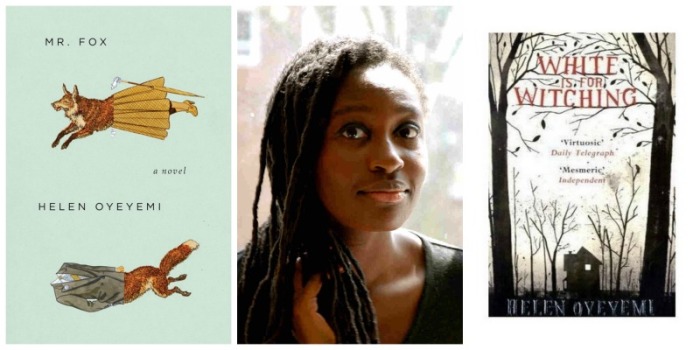 A black British novelist and playwright, Oyeyemi focuses on women of color battling what it means to be both female and black in contemporary contexts. In that sense, she reminds me a lot of Toni Morrison, but, unlike Morrison, she does not focus on the historical so much as subverting literary traditions, most often in fairy tale settings, as in Boy Snow Bird which is told from the stepmother’s perspective as she raises Snow, her stepdaughter, and Bird, her new daughter, who is born a light-skinned African American (a trait taken from her father who passes as white.)I’ll be reviewing Oyeyemi’s White is For Witching later this month; the book is a weird cross between Shirley Jackson subtle horror and Toni Morrison slice-of-life magical realism.
A black British novelist and playwright, Oyeyemi focuses on women of color battling what it means to be both female and black in contemporary contexts. In that sense, she reminds me a lot of Toni Morrison, but, unlike Morrison, she does not focus on the historical so much as subverting literary traditions, most often in fairy tale settings, as in Boy Snow Bird which is told from the stepmother’s perspective as she raises Snow, her stepdaughter, and Bird, her new daughter, who is born a light-skinned African American (a trait taken from her father who passes as white.)I’ll be reviewing Oyeyemi’s White is For Witching later this month; the book is a weird cross between Shirley Jackson subtle horror and Toni Morrison slice-of-life magical realism.
- Junot Diaz
Writing Style: Somehow incorporates an entire cultural environment in the way his characters move and talk within the prose. Uses slang and bilingual language with a focus on movement and rhythm in the text so it sounds like natural thought or dialogue. Lots of asides and footnotes.
Start With: This is How You Lose Her (2012). This is a short story collection but all the vignettes are interconnected by character (a boy named Yunior who shows up in Diaz’s other works) and themes (loss, identity, love and relationships, especially infidelity).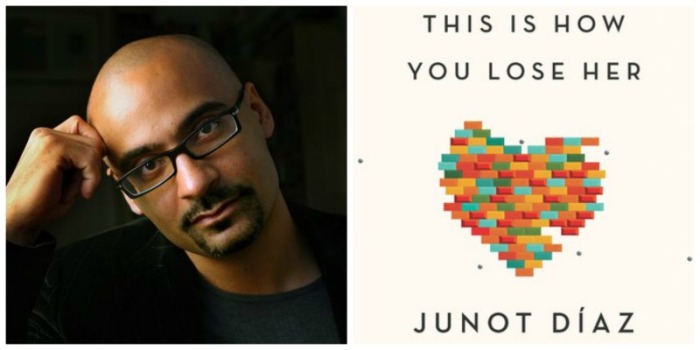 You may have seen a few of Diaz’s quotes on media representation floating around Tumblr and the like, and if not, it’s something everyone should see:
You may have seen a few of Diaz’s quotes on media representation floating around Tumblr and the like, and if not, it’s something everyone should see:
“You guys know about vampires? … You know, vampires have no reflections in a mirror? There’s this idea that monsters don’t have reflections in a mirror. And what I’ve always thought isn’t that monsters don’t have reflections in a mirror. It’s that if you want to make a human being into a monster, deny them, at the cultural level, any reflection of themselves. And growing up, I felt like a monster in some ways. I didn’t see myself reflected at all. I was like, “Yo, is something wrong with me? That the whole society seems to think that people like me don’t exist? And part of what inspired me, was this deep desire that before I died, I would make a couple of mirrors. That I would make some mirrors so that kids like me might see themselves reflected back and might not feel so monstrous for it.”
Diaz is a Dominican American writer whose work generally focuses on the immigrant experience in America. His protagonists are young men of color who struggle with their native roots (i.e. Dominican Republic) and living in modern America which isn’t all it’s cracked up to be.
- Malinda Lo
Writing Style: Action-oriented with limited perspectives. Fast pacing and strong character development, (women of color protagonists), as well as LGBT representation
Start With: Huntress (2011). A prequel to her first novel, Ash (2009), it also reads well as a standalone, following the journey of two girls, Taisin and Kaede, as they are sent on a mission to visit the city of the Fairy Queen and save their crumbling world. (You can read my brief review of this book here.)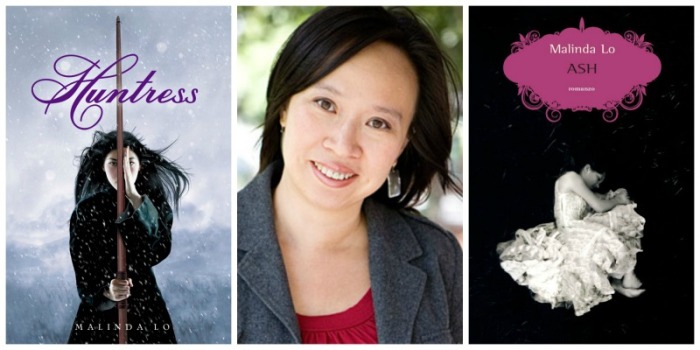 Though I’ve written a bit about Huntress before, I didn’t get a chance to discuss much of Lo herself. A Chinese American immigrant, Lo has co-founded Diversity in YA with Cindy Pon, (another YA author), and their statistics on representation of people of color, LGBTQAI characters, and disabled characters are pretty awesome so be sure to check out their blog.
Though I’ve written a bit about Huntress before, I didn’t get a chance to discuss much of Lo herself. A Chinese American immigrant, Lo has co-founded Diversity in YA with Cindy Pon, (another YA author), and their statistics on representation of people of color, LGBTQAI characters, and disabled characters are pretty awesome so be sure to check out their blog.
- Haruki Murakami
Writing Style: Simplistic and straightforward writing about mind-bendingly surreal characters and situations. English translation seems a little stilted at times, but generally flows smoothly. Also of note, any given Murakami novel will have the following: someone making pasta, many cats (possibly speaking but probably not), at least one awkward and clinical sex scene, and a ~mysterious~ woman. These should not deter you. Embrace them wholly!
Start With: After Dark (2007). Most people seem to suggest starting with The Wind-Up Bird Chronicle (1997), which is awesome but can be overwhelming for someone new to Murakami’s stark weirdness. After Dark deals with a smaller cast and time frame, mostly following 19-year old Mari as she navigates all that night-time Tokyo has to offer. Also there is a parallel storyline where Mari’s sister, Eri, is asleep in a dreamscape next to a very menacing television.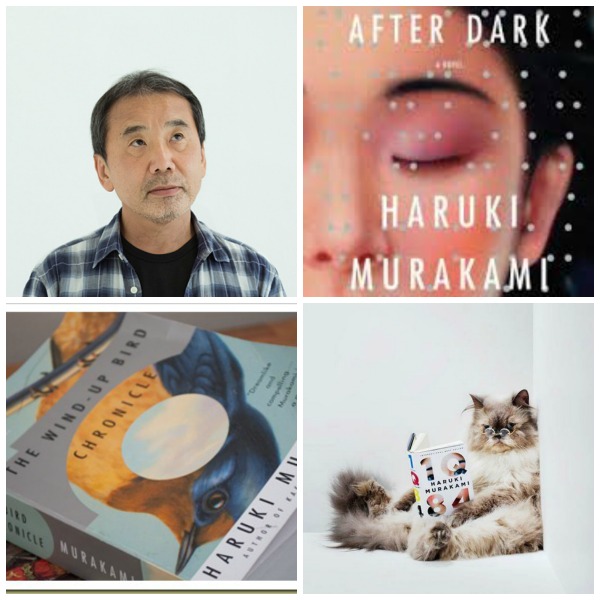 Murakami is so mainstream these days that I think people forget they are actually reading about Japanese society and culture by a Japanese author, but that is pretty dang important representation. His themes of alienation and identity are universal, which probably speaks to his appeal, as well as his unflinching way of looking at the crueller aspects of mankind’s history and the microcosm of these acts in the way humans treat one another on a daily basis. Also: So many cats…
Murakami is so mainstream these days that I think people forget they are actually reading about Japanese society and culture by a Japanese author, but that is pretty dang important representation. His themes of alienation and identity are universal, which probably speaks to his appeal, as well as his unflinching way of looking at the crueller aspects of mankind’s history and the microcosm of these acts in the way humans treat one another on a daily basis. Also: So many cats…
- Liu Cixin
Writing Style: Okay, gotta be honest. Haven’t read this one yet but I’m excited enough with its existence to talk about it here. Chebk’s holding this for us in her TBR pile and from what we’ve seen of it, the translation isn’t the best, leaving behind prose that is direct and stark.
Start With: The Three-Body Problem (2008). The first in a trilogy, this book become one of the most popular science fiction book in China upon publication. During the Cultural Revolution, the military secretly sends signals to contact extraterrestrials, who then decide to invade Earth. I’m sure there’s more to it than that, but that’s what I’ve got so far.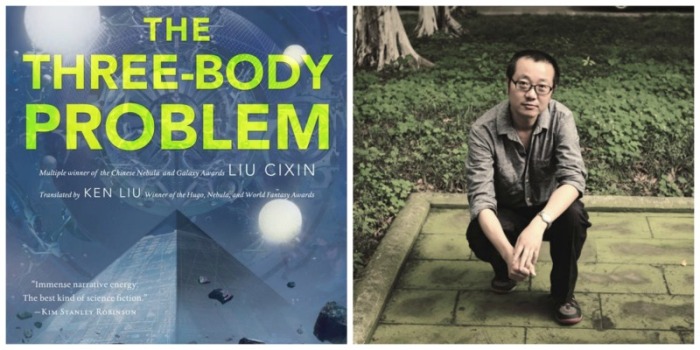 Evidently Cixin is the rockstar of science fiction in China and that’s amazing. Most of his works focus on China’s role in a futuristic world, which is definitely different from the Western-centric views of most mainstream sci-fi. For Firefly fans, maybe we will finally get a view of a truly futuristic world with China as a major world power and influence on intergalactic society.
Evidently Cixin is the rockstar of science fiction in China and that’s amazing. Most of his works focus on China’s role in a futuristic world, which is definitely different from the Western-centric views of most mainstream sci-fi. For Firefly fans, maybe we will finally get a view of a truly futuristic world with China as a major world power and influence on intergalactic society.
Whew. I hope these recs help anyone wanting to branch out into more diverse literature. Let’s add to this list together this year and keep promoting media representation of races, as well as sexuality and disabilities. Any other PoC authors you can rec for us? Drop us a line in the comments!

Such an interesting post. I do think that we need more diversity in the books we read. It is the best and easiest way to learn about new cultures and to get a glimpse into the way people from different places/minorities think, feel and react to situations. Murakami and Junot Diaz are among my favourite authors. As for more authors I would recommend Yoko Ogawa, especially if you like Murakami, she writes these weird and hunting stories. Also Xiaolu Guo is another favourite, her book 20 Fragments of a Revenous Youth is absolutely amazing giving us glimpses of the life of a young girl in today’s China and lastly another favourite Orhan Pamuk, a turkish writer that has won a Nobel Prize, and his book Istanbul Memories of the City is a beautiful non fiction book that blends the memories and personal experiences of the author and a brief history of the city.
LikeLiked by 1 person